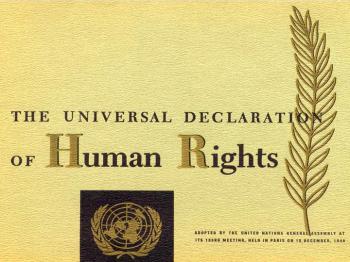The Universal Declaration of Human Rights
The Universal Declaration of Human Rights
The Universal Declaration of Human Rights is a charter accepted and adopted by the United Nations. Officially, the Universal Declaration of Human Rights is part of the International Bill of Human Rights which is an informal title given to two treaties created by the United Nations. The Universal Declaration of Human Rights came into being after WWII and it is representative of the first time in history where the world was mobilized to establish rights that all human beings are innately born with.
After the atrocities committed in Nazi Germany, there was a need for something of this nature as one of the United Nation’s main goals was to reiterate fundamental human rights for all. Several people were involved in drafting the United Nations, the Universal Declaration of Human Rights, and the forerunner being John Peters Humphrey. At the time of the drafting of the Universal Declaration of Human Rights he was the Director of the Division of Human Rights within the United Nations Secretariat. The Commission on Human Rights was commissioned to take on this project after Humphrey provided them with the initial draft. The United Nations wanted the members of this commission to be representative of the world and it was a very diverse group of people originating from countries ranging from Australia, Iran, and Yugoslavia to just name a few. A very famous author of the Universal Declaration of Human Rights was Eleanor Roosevelt who was the chairman.
The Universal Declaration of Human Rights was adopted by the United Nations General Assembly on December 10, 1948 by a landslide vote. No countries were against this charter, while 8 abstained; these countries were Soviet Bloc states. As of 1998, the Universal Declaration of Human Rights has been unanimously adopted by the United Nations General Assembly. Every year on December 10, the Universal Declaration of Human Rights is commemorated and it is known as Human Rights Day or International Human Rights Day.
The Universal Declaration of Human Rights has not only been adopted by the United Nations and been integral in many of their efforts but it has also become a part of customary international law. Customary international law is the basis of practice in the International Court of Justice. Apart from being institutional in international law and the United Nations, this charter has also had a tremendous influence in the constitutions of other countries. Furthermore, this document has also served as the foundation for two major United Nations human rights covenants.
The Universal Declaration of Human Rights has received both praise and criticism from dignitaries across the world. Officials around the world including Pope John Paul II as well as organizations such as the EU have praised this document. However, in certain parts of the world this charter does not have the same creed. Primarily in Islamic countries such as Sudan, Pakistan, Iran, and Saudi Arabia there has been criticism for the Universal Declaration of Human Rights. Their argument is that the charter does not take into account cultural and religious factors. While there is a certain level of criticism for this declaration, it is for the most part one of the defining pieces of work in the 20th century and has had a tremendously positive influence worldwide.
Related Topics
- Afghanistan Human Rights
- Bolivia Human Rights
- UN Peacekeepers
- Illinois Human Rights
- Africa Human Rights
- World Bank
